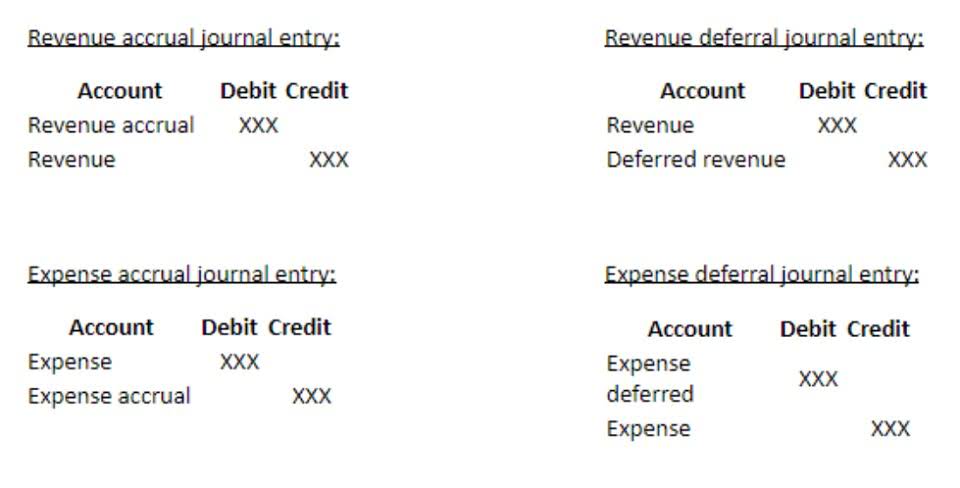
The primary distinction between accrued and deferred accounting is when revenue or expenses are recorded. An accrual is an accounting transaction that is brought forward and recorded in the current period even though the expense or revenue has not yet been paid or received. The $500 in Unearned Revenues will be deferred until January through May when it will be moved with a deferral-type adjusting entry from Unearned Revenues to Service Revenues at a rate of $100 per month. Further, the company has a liability or obligation for the unpaid interest up to the end of the accounting period.
Avoiding Adjusting Entries
- You would book the entry by debiting accounts receivable by $10,000 and crediting revenue by $10,000.
- For transactions that occur as part of day-to-day operations, no adjusting journal entry is needed.
- Accrued expenses refer to the recognition of expenses that have been incurred but not yet recorded in the company’s financial statements.
- The adjusting journal entry for December would include a debit to accounts receivable and a credit to a revenue account.
- The rules for recording accruals are generally the same as the rules for recording other transactions in double-entry accounting.
- An adjusting entry to record a Expense Accrual will always include a debit to an expense account and a credit to a liability account.
- Accruals and deferrals are important accounting concepts to familiarize yourself with when running any business.
It clarifies how the company’s cash position has changed over time, segregating cash flows into operations, investing, and financing activities. This statement is particularly useful in understanding the timing of cash movements in relation to the earnings reported on the income statement. Explore the nuances of accrual and deferral accounting to understand their impact on financial reporting, statement accuracy, and fiscal planning. accrual vs deferral Accrued interest refers to interest that’s been earned on an investment or a loan but hasn’t yet been paid. It would be recorded as an accrual on the company’s financial statements if the firm has a savings account that earns interest and the interest has been earned but not yet paid. Businesses would not have an accurate picture of what they owe if they only recorded transactions when revenue was received or payments were made.
Deferred Revenue
However, the electricity expense of $3,000 has already been recorded in the period and, therefore, will not be a part of the income statement of the company for the next period. Deferred expense occurs when a company pays for goods or services in advance but has not yet incurred the related costs. Accruals are important because they help to ensure that a company’s financial https://www.bookstime.com/ statements accurately reflect its actual financial condition. The liability account will be decreased through a debit and the cash account will be reduced through a credit when the payment is made in the new year. Accrual accounts include accounts payable, accounts receivable, accrued tax liabilities, and accrued interest earned or payable among many others.

Accrued Interest
Similarly, your insurance company might automatically charge your company’s checking account each month for the insurance expense that applies to just that one month. Hence the cost of the remaining five months is deferred to the balance sheet account Prepaid Insurance until it is moved to Insurance Expense during the months of January through May. One of the key attributes of deferral accounting is the recognition of revenue.
- Accruals are important because they help to ensure that a company’s financial statements accurately reflect its actual financial condition.
- As the company fulfills its obligation—whether that’s shipping a product, providing a service, or anything else it was paid to do—it gradually reduces the liability on its balance sheet.
- Likewise, in case of accruals, a business has already earned or consumed the incomes or expenses relatively.
- Accruing tax liabilities in accounting involves recognizing and recording taxes that a company owes but has not yet paid.
- This is in contrast to cash accounting, where transactions are recorded only when cash changes hands.
- Until the money is earned, the insurance company should report the unearned amount as a current liability such as Unearned Insurance Premiums.
- Before, jumping into detail, let’s understand the overview and some key definitions.
Deferrals mean the cash comes before the earning of the revenue or the incurring of the expense. The choice between accrual and deferral accounting affects not only the immediate financial statements but also long-term business strategies, budgeting, and forecasting. Understanding these methods is essential for stakeholders who rely on accurate financial information to make informed decisions. Accrued expenses refer to the recognition of expenses that have been incurred but not yet recorded in the company’s financial statements. The expenses would be recorded as an accrual in December when they were incurred if a company incurs expenses in December for a service that will be received in January. Accruals are revenues earned or expenses incurred that impact a company’s net income on the income statement but cash related to the transaction hasn’t yet changed hands.
Deferred Revenue vs. Accrued Expense: An Overview
- Countick Inc. is not a public accounting firm and does not provide services that would require a license to practice public accountancy.
- When you join PRO Plus, you will receive lifetime access to all of our premium materials, as well as 11 different Certificates of Achievement.
- Similarly, accruals and deferrals are also recorded because the compensation for them has already been received or paid for.
- However, the electricity expense of $3,000 has already been recorded in the period and, therefore, will not be a part of the income statement of the company for the next period.
- The same entry will be recorded once a month for twelve months until all the expense is captured in the correct month and the asset is fully “used up”.
- Accrual and deferral are two fundamental accounting concepts that play a crucial role in recognizing revenue and expenses in financial statements.

Expenses Accrual Journal Entry


Leave a Reply